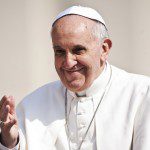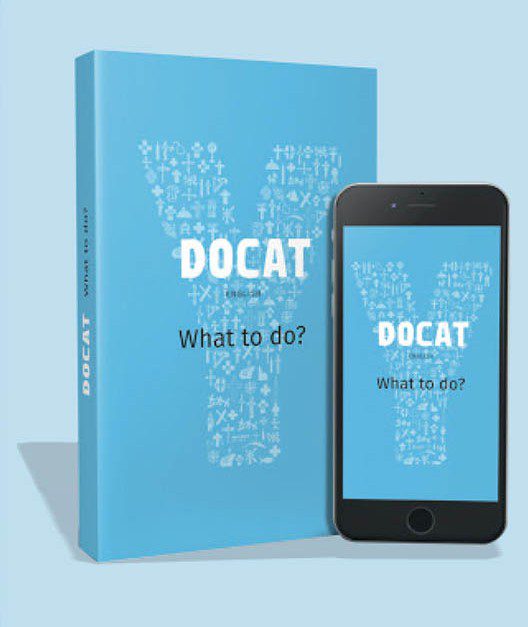
Pope Francis has gifted World Youth Day pilgrims with a remarkable presentation of some very essential church doctrine, namely, Catholic social teaching (CST).
On July 26, 2016, the Pope helped to launch DOCAT internationally.
DOCAT offers Church teaching and guidance on how one is to live upon encountering Jesus Christ. Universal and well known principles are offered, yes, but DOCAT also manages to engage the very practical and direct questions many youth and young adults are asking about Christian living, our relations with one another and with groups, the role of the Church, and more.
Brought to you by the makers of YOUCAT (2011), DOCAT also serves as a worthy companion to the popular yellow youth catechism.
Ignatius Press described DOCAT in a release last week as follows:
DOCAT, which is the follow-up to YOUCAT, is a popular adaptation of the social doctrine of the Catholic Church that draws on Scripture, YOUCAT, the Catechism and the Compendium of Catholic Social Teaching, and features a foreword by Pope Francis, who will help launch the book worldwide today at World Youth Day in Krakow, Poland.
DOCAT is written with help from church and business leaders, social activists and young people in a popular Q-and-A, YOUCAT style that guides young people in conscience formation and Catholic action on social and political issues. It shows Catholics how to apply Gospel values to poverty, imbalance of wealth, employment and unemployment, the use of natural resources and environmental concerns, terrorism, immigration and abortion, among other topics.
DOCAT features inspirational and insightful quotes from Catholic leaders and saints, including St. Pope John Paul II, Mother Teresa, Pope Francis and Pope Benedict; excerpts from Francis’ magisterial teaching; and important statements from his immediate predecessor regarding the four principles of Catholic social teaching: the dignity of the human person, the common good, subsidiarity and solidarity.
The DOCAT follows the presentation style of the YOUCAT, and expounds on the Church’s social teaching as outlined in the Compendium of the Social Doctrine of the Church, similar to how the YOUCAT took the Catechism of the Catholic Church for its inspiration and structure.
While some adults may have come to see the YOUCAT as no more than a catechism for youth, the DOCAT as far less likely to be dismissed so easily.
Those familiar with the Compendium of the Social Doctrine of the Church will see similarities as soon as you turn to the table of contents: the chapters of the DOCAT cover the same topics and in the same order as those of the Compendium.
I would say, however, that the DOCAT may readily serve as an initial introduction to Christian doctrine and practice for young and not-so-young, alike.
Perhaps some adults will find less interest in the various pictures and doodles – even though they can be incredibly helpful in communicating different messages. Nonetheless, the content and presentation are certainly a welcome contribution to the catechetical and evangelical efforts of the universal church.
Like the YOUCAT, the DOCAT does have, as mentioned, various illustrations and images, and is offered in a useful question and answer format.
It is not, though, a mere YOUCAT version of the Compendium of the Social Doctrine of the Church, nor the simple social teaching version of YOUCAT.
There are several advantages in utilizing DOCAT.
Advantages
DOCAT is able to cite and reference over a ten years’ worth of material not included in the Compendium of the Social Doctrine of the Church, of which, Benedict’s Caritas in Veritate and Francis’s Laudato si’ are especially relevant.
This, alone, makes DOCAT an attractive resource. It is difficult to think of a text that has an updated demonstration of the Church’s social teaching, offered in the simple, practical style of DOCAT.
While some, including myself, very much appreciate the Compendium of the Social Doctrine of the Church and its generous (if not almost exclusive) use of quotations, the casual wording employed by DOCAT makes it approachable for beginners.
However, DOCAT doesn’t leave beginners with and curious readers without direction upon completion of the text. For starters, DOCAT doesn’t want to be the only source for its readers and encourages them to go deeper.
The “About” section of DOCAT, found in the pages prior to the Pope’s introduction, states:
Young people especially ought to take an interest in reading the major documents of the Church in the original text and in guiding their actions by the maxims of truth, justice, and charity that are contained in them.
Every one of the 328 answered questions in DOCAT offer a reference to one or all three of the mentioned documents: the Catechism of the Catholic Church, YOUCAT, and the Compendium of the Social Doctrine of the Church.
Scripture references are found in the margins and throughout the text.
The DOCAT provides quotes from dozens of unexpected men and women throughout the text to offer a humble invitation to embrace and search for the truth of love, no matter who is presenting it or which wisdom tradition precedes it.
Perhaps all of us will expect to find quotes from previous Popes or different Christian writers. Some, though, will be intrigued to find quotes from other figures less-associated with Catechetical resources.
Meister Eckhart, Emmanuel Levinas, Abraham Lincoln, Gabriel Marcel, Martin Buber, Immanuel Kant, John F. Kennedy, Karl Jaspers, and Bartolomé de las Casas, among many others, are quoted throughout DOCAT’s margins. Yet, you’ll find quotes from persons more readily embraced by conservative-leaning camps, such as: Ronald Reagan, Antonio Rosmini, Lord Acton, Hernando de Soto, Adam Smith, Antonin Scalia, J. P. Morgan, Nelson A. Rockefeller, Henry Ford, and Robert McNamara, etc.
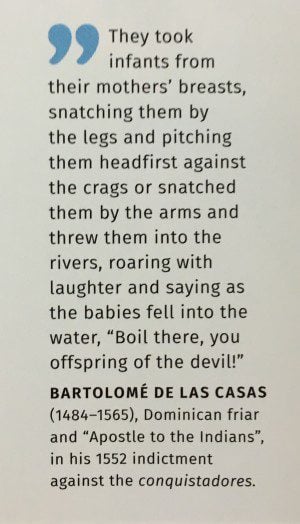
There is more in the thought, work, and legacy in the first group of names that many readers of social doctrine may find compatible with the Church’s social doctrine than in the second’s. But, this is what helps make DOCAT great.
If a quote isn’t from Sacred Scripture, current or recent magisterial teaching, it’ll be from one of several possible mentioned figures or others. What’s the purpose of including these quotes?
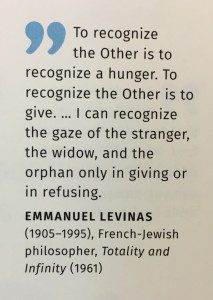
DOCAT explains that a quote from a non-scriptural, non-(current- or recent-)magisterial source sometimes “underscores the meaning of the text; other times it creates a tension with the text. The point is always to foster a living confrontation with the truth.”
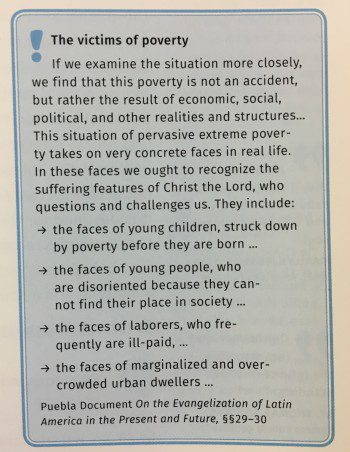
This characteristic not only encourages a “living confrontation with the truth” for young people, it does so for all people. This same confrontation takes us beyond the disastrous confines established by a conservative integralism, but invites us to seek truth in our encounters with others, face-to-face, appreciating its living manifestation wherever Truth may be found.
Certainly, one need not expect to find a perfect expression of truth in every word and deed of the persons quoted, but they are persons and there is always some truth to be learned. We also find quotes from different Papal, regional and national Bishops’ conferences, and conciliar documents.
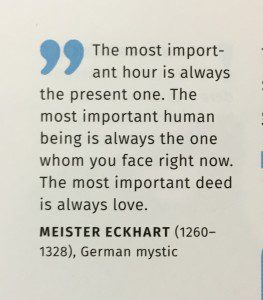
Be a revolutionary! Denounce injustice! Protest the exploitation of workers! Dissolve terrorism and violence by tending to their causes! Being critical towards the positions of bishops and priests is welcome!
This is clearly a fresh invitation to Catholics to be active, to learn, to engage others and work for justice in solidarity with present and future generations.
The language being used isn’t communicating tolerance of Catholics who are protesting injustice, but is, instead, noting that such an active love of God (and the corresponding denunciation of all manifestations of sin) is to be expected as the norm for us all.
There are many noteworthy aspects to the DOCAT, but I will end our positive discussion of the text by noting one unique area of teaching.
You might recall the four principles discussed in chapters three and four of the Compendium of the Social Doctrine of the Church: personhood, the common good, solidarity, and subsidiarity.
Your DOCAT does not part from these. Interestingly, however, DOCAT question 263 asks:
“Sustainability – a new social principle?” Have we a fifth principle for discerning and measuring our actions, structures, and policies? Answer 263 states,
Given the particular challenges of the present time, it seems appropriate to add another principle to [the four mentioned above]: the principle of sustainability. This principles of sustainability relates to and puts into action the traditional principles of social ethics with regard to human living conditions and the survival of the earth itself. When people discuss sustainability, they are talking about safeguarding in the long term the stability of the earth’s ecosystem and its natural ability to regenerate its resources.
The principle of sustainability ties the safeguarding of human life and non-human life together. Of course, Laudato si’ has made its influence in this area of Catholic social teaching. Using this fifth principle, which is very much consistent with the first four and difficult to distinguish fully, our economic models, policies, and actions, are up for criticism – if not total rejection.
Some readers may find similarities with this fifth principle and Enrique Dussel’s work. Recall Dussel’s principle of safeguarding life in perpetuity, humans in particular and the life of all creation in general. We could state it as expressing: a) the rate in which we use renewable resources should not exceed the rate in which they are replaced; b) the rate in which we use non-renewable resources should not go beyond the rate in which new sources of energy are implemented – solar energy gets special mention for Dussel and in Laudato si’; and c) the rate of environmental contamination and industrial waste should not go beyond the possible rate of recycling and reversing previous negative effects, including global warming and its causes.
This is quite exciting, and where Dussel’s course is more explicit in rejecting capitalism, for example, DOCAT takes a more subtle approach, even if it is more difficult to avoid landing at the same conclusion as Dussel’s.
DOCAT’s Potential Weaknesses
What’s missing in your DOCAT?
The DOCAT is excellent. Nevertheless, I wonder whether there are areas that should require additional attention, detail, or modification.
Because DOCAT doesn’t seek to be the final reference or source, it rightly encourages readers to go beyond itself – to other primary, traditional sources. Yet, I could not find a comprehensive index of sources, cited or otherwise suggested. The Compendium of the Social Doctrine of the Church produces a decent works cited page one could use, and perhaps DOCAT could have done at least that.
The only pages offering a “list” of cited, referenced, and additional resources are those producing the handy chart and summary of CST milestones (pgs 38-39) and the key of abbreviations of documents cited (pg. 319).
For people unfamiliar with finding and accessing various resources on CST, the DOCAT could have certainly offered more assistance. The paperback version, for example, could have included URLs, or mini-urls, QR-Codes, or social media networks worth visiting where cited and additional resources could be found. The DOCAT App includes the references to the CCC, CSDC, and YOUCAT – as the paperback version does – but could have easily turned those references into hyperlinks for quick access. This doesn’t seem to be an unreasonable technological inclusion for a teaching document that specifically mentions the Pope’s Twitter handle @pontifex (DOCAT, Q. 39).
Moreover, an appendix of national and regional Episcopal conferences, along with their documents and statements on related areas of CST, would have been an interesting addition. Perhaps this could have varied by language and world region (where printed/distributed) in order to consolidate.
An appendix of historical and/or current examples of accessible organizations working for the common good would seem useful in aiding readers towards greater participation.
While the DOCAT briefly touches on homosexuality, I wonder if it could (or should) have expressed (what seems to be) its move away from what some have called dated, or non-compassionate language in a more pronounced way. The DOCAT avoids citing/referencing pars. 2357-2359 of the Catechism of the Catholic Church directly, and skips out on citing YOUCAT Q 415, which cites CCC pars. 2358-2359.
Instead, DOCAT answer 124 discusses marriage and, in so doing, notes that because of its very nature adding “homosexual” or “same-sex” as a descriptor or prefix of a marriage is non-sense (in light of the definition used). This is direct, but appears cautious. It may be difficult to figure out where one can turn for a more detailed treatise on sexuality, marriage and family by looking at the references offered, as they inevitably will bring us back to CCC 2357, which is using terms and descriptions DOCAT is seemingly trying to avoid. This does some awfully curious for a recent publication, aimed at youth, on a topic that is incredibly relevant.
Perhaps the most we could ask for in the DOCAT is a word of outreach and hope for those of us actively living in ways that do not fully reflect the Church’s teaching, as found in answer 126: “The Church quite clearly regards marriage and family as the vocation which corresponds to the deepest longings of man and woman. In this she takes in the current debate a firm stance against the increasing breakdown in the close connection between sexuality and interpersonal ties, between emotion and responsibility, sexuality and children, partnership and family. Nevertheless, the Church also reaches out with charity to those who live in other ways, and looks for opportunities to make of these forms a path of conversion towards the fullness of the vocation of marriage.”
Moving on, the DOCAT could have been a bit clearer on political parties. Qs 211 and 219 discuss political parties and provide what could seem to be opposing prescriptions. The answer to Q 211 encourages involvement in political parties, while making distinguishing Christianity and Charity from ideology and political programs. The answer to Q 219 becomes a little muddy when we apply it to debates among Catholics in the US. After a general word of encouragement about joining and becoming active in political parties, admitting, “there will scarcely be any parties in which Christian doctrine is reflected 100 percent”, the DOCAT reads,
The prerequisite for responsible involvement is a fundamental recognition by the party of inviolable human dignity, of human rights, personhood, and the defense of innocent human life at all stages of its development and in all conditions of dependence, of marriage as a union of a man and a woman, and also of the Church’s legal status in our society, as is codified in various national constitutions. Catholic Christians have no place in political parties in which violence against human life or dignity is glorified or approved or that have a platform that includes social hatred, demagoguery, racism, or class warfare.
So do we take this as teaching that Catholics can be, among other choices, members of the Democratic or Republican parties? Or is this teaching that Catholics can be neither members of the Democratic nor Republican parties? Unfortunately, a decent discussion on conscientious objection (in voting) is nowhere close to these particular questions in the DOCAT and, as noted, additional resources (such as the USCCB’s Forming Consciences for Faithful Citizenship, for example) are not provided.
As we close, I’ll note that, while Amoris Laetitia had not been released, some recent discussions on promoting an interest in and defense of marriage and family could have been included. I think the furthest the DOCAT goes on this area is in Pope Francis’s introduction. Certainly, pulling from Pope Francis, this economy kills and is opposed to the family structure – it is anti-life (human and organic), anti-marriage, anti-family, and a-theistic. Which economy are we speaking of?
Which economy did not (and has not) respect the transcendental calling of human beings, or produce the conditions and wages necessary for a decent life, let alone for the starting of a family?
The way capitalism influences, prefers, and reinforces vicious ways of living – the way it is an option for death – has an impact on our ethics, relationships, family forming, marriages, politics, energy use, transportation, communication, studies, and so much more. Of course, there is disagreement on what exactly we mean by capitalism. The DOCAT asks: “Is capitalism compatible with human dignity?”
The DOCAT answers:
In view of the spectacular failure of the central planning economy in the Society system, John Paul II wrote: “If by ‘capitalism’ is meant an economic system which recognizes the fundamental and positive role of business, the market, private property and the resulting responsibility for the means of production, as well as free human creativity in the economic sector, then the answer is certainly in the affirmative, even though it would perhaps be more appropriate to speak of a ‘business economy’, ‘market economy’ or simply ‘free economy’. But if by ‘capitalism’ is meant a system in which freedom in the economic sector is not circumscribed within a strong juridical framework which places it at the service of human freedom in its totality, and which sees it as a particular aspect of that freedom, the core of which is ethical and religious, then the reply is certainly negative” (CA 42).
Will neoconservative organizations claim that this is a victory for their capitalist preferences? This may be the case. “The answer is obviously complex…” John Paul II prefaces his answer in CA 42 with that sentence, which isn’t exactly present in the DOCAT quote.
Besides complexity, there’s some confusion, especially when Cardinal R. Marx has encouraged us to think beyond capitalism and Abp. Wenski of Miami has stated that capitalism destroys relationships (as sin, does); as well as when figures cited in the DOCAT and by Pope Francis have rejected capitalism – including L. Bloy, G. Marcel., M. Buber, D. Day, O. Romero, R. Guardini, G.K. Chesterton, etc. That capitalism would be rejected by thinkers and believers past and present makes sense; that the DOCAT would be so vague, utilizing a portion of CA often employed to defend the neoconservative (attempted) case for capitalism, does not make sense.
This is especially the case since John Paul II could have, but did not, reinforce any perceived defense of capitalism, but, six years after CA, took us back to Laborem Exercens and said, the Church “also opposes the claims of capitalism, proclaiming ‘the principle of the priority of labour over capital’, since human labour ‘is always a primary efficient cause, while capital, the whole collection of means of production, remains a mere instrument or instrumental cause’ of the process of production.” We are further perplexed by DOCAT‘s vagueness when reading the remarks of Bernhard Meuser, founder of the YouCat Foundation, who said in a recent interview on the release of DOCAT:
“We are living in the ruins of two great ideologies: of capitalism and of communism. Both destroyed the world,” he said, explaining that now “we have to change the world.”
To “change the world”, as Meuser says (probably referencing Pope Francis’s introduction), we must announce/live the Gospel; it is interesting that Meuser offers us the Gospel in opposition to (the anti-life economic structure of) capitalism.
The DOCAT insists on living wages, fair prices – even, fair trade – sustainability, simplicity, and living a spiritual life. Even if it seems that a false-dichotomy is presented in the DOCAT, between the USSR and capitalism, it remains to be seen whether those ideals of justice and piety can be given life – and sustained – within a capitalist regime. Human life, marriage and family, non-human life: these remain opposed and threatened by capitalism, yet the DOCAT does not connect these dots for its readers nor attempts to engage in a worthwhile discussion.
I brought up Amoris Laetitia because it helps, like Laudato si’ (and many other Papal documents, really), in connecting those dots between life, marriage and family, and the “prevailing economic system” (cf. Evangelii Gaudium) or “current models of production and consumption” (cf. Laudato si’).
Of course, Familiaris Consortio (cf. 81, 85), for example, along with various teachings from the general audiences cited in Amoris Laetitia could have been used to at least touch on this area of concern directly – especially as the DOCAT is presented to the youth who are subject to those same economic factors addressed by the Pope(s).
Lastly, I think many will find the price of DOCAT prohibitive. DOCAT App can be downloaded for free, but after today (31 July), you must pay $16.96 for the actual text of the DOCAT if you want to download and view it to your phone, tablet, or other mobile device. Of course, the fact that DOCAT is accessible electronically only for those who use smart phones and tables will be a challenge for prospective readers without these (pricey) technologies. As a web-only sale price, Ignatius Press is offering the DOCAT in paperback form for $16.96, with remarkable bulk-pricing discounts. Nonetheless, DOCAT‘s price, in both electronic and paperback form, seems difficult to justify when the web-versions of the Catechism, Compendium of the Social Doctrine of the Church, and every document cited in the DOCAT are free with internet access.
Our Final Analysis
In the final analysis, however, I would say the DOCAT deserves praise.
It’s unwillingness to abandon the priority of giving one’s life to Christ against programs of a purely political nature is very much applaudable. As Pope Francis writes in its introduction, “[The DOCAT] is like a user’s manual that helps us to change ourselves with the Gospel first, and then our closest surroundings, and finally the whole world. For with the power of the Gospel, we can truly change the world.”
Remember that part of this user’s manual includes a new principle for us, one foreshadowed in some of the last century’s development in social doctrine and action: the principle of sustainability!

Will the DOCAT be used, studied, and ultimately motivate a greater desire for deeper and more complex study, courageous action, and the necessary search for Jesus in the sacraments, in prayer, and in the poor? We can hope so.
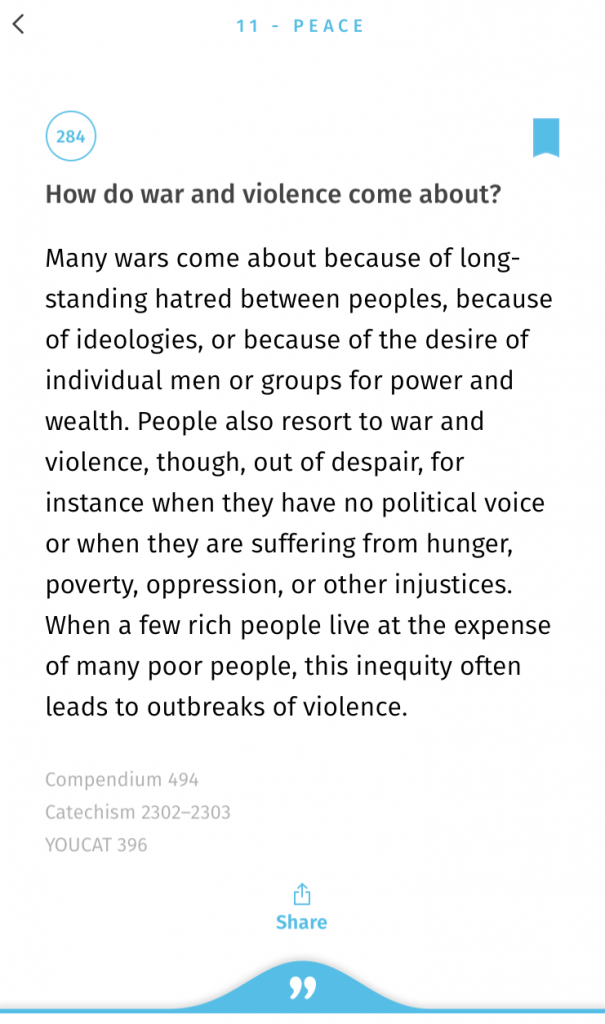
It is difficult to create a resource that can do everything that a beginner may need in the area of Catholic social doctrine, let alone one that parents and non-parent catechists can use as a guide or starting point, but I think the DOCAT sits with little to no company on the list of those aides that are most likely to succeed in presenting praxis – the lived Gospel of love – in a dependable and accessible fashion.
The DOCAT is a gift for the Church and a victory for evangelization and catechesis. In his introduction to the resource, Pope Francis is correct in calling DOCAT “a magnificent introduction to Christian action.”
The DOCAT is a great resource and an excellent starting point for Catholics of all ages; I am sure that I would have grown in my interest, knowledge, and love of our Catholic faith if I had something like the DOCAT during my youth.
DOCAT is available on Amazon ($16.54) and through Ignatius Press ($16.96), on the Apple and Google play app stores (as an in-App purchase for $16.96 starting 1 August, 2016), and has an accompanying study guide also available through Amazon ($8.49) and Ignatius Press ($7.61). Availability varies by language and world region.
Organizations can learn more about bulk-pricing for the DOCAT via Ignatius Press. I hope to peruse and comment on the DOCAT study guide if I can come to acquire one.
Comment or share feedback on the #DOCAT below.
Peace,




